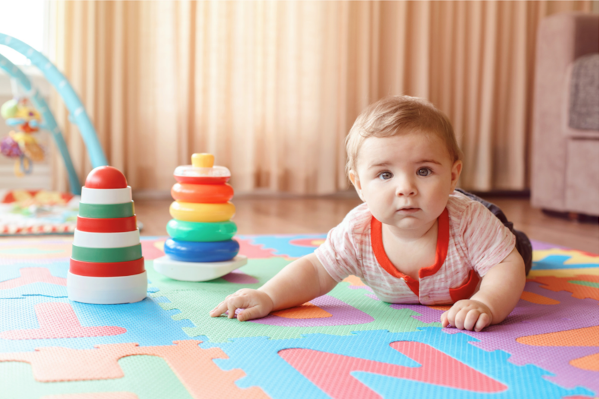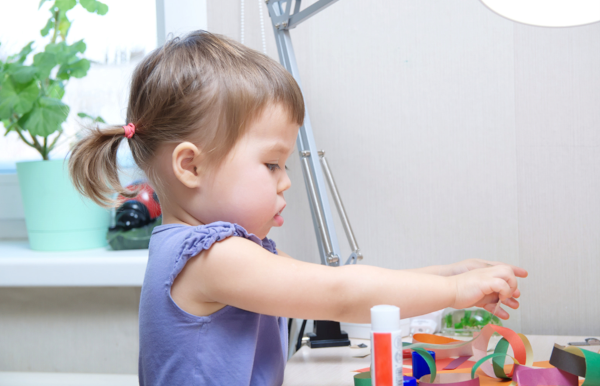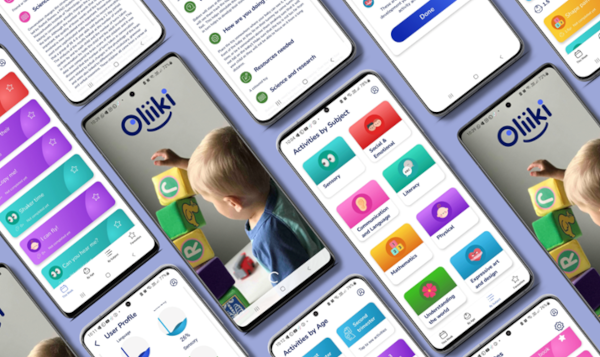Days at nursery are jam-packed with exciting activities. But do your practitioners know how these activities help with baby brain development? The development that happens in early childhood is vitally important, even though our brains keep developing way into our 20s.
We spoke to Clare Stead, founder of Oliiki, the baby development app, to quash the top 10 myths surrounding babies’ brain development and how you and your practitioners can help.
Hear more from Clare Stead talking to our own Priscilla Moreno all about Oliiki, baby brain development and the first 1000 days over on the Early Bloom Podcast!
Meet the expert: Clare Stead

Clare Stead is incredibly passionate about helping children thrive and learn in early childhood. A qualified teacher, Clare spent over ten years in Zambia working tirelessly to improve the educational system and resources for children in the early years.
During her time in Zambia, she noticed that even when the children were all given the same access to education, there were still huge differences between those who were ready to learn and eager to get to the next stage of learning, and those who weren’t quite there yet.
Genetics can play a part, of course. However, the children’s experiences were very similar, and this got Clare thinking. Do we know the how and why behind the experiences we offer our babies and toddlers? Are the activities purposefully chosen or a product of an evening scrolling on Pinterest?
From there, Clare created Oliiki, the app for parents and practitioners that shares developmental activities.
Read on to learn how babies’ brains develop and quash ten common myths and misconceptions about baby brain development.
How do babies' brains develop?
Babies’ brains develop through early experiences, interactions, and relationships. So it’s unsurprising that relationship building and maintenance underpin the EYFS statutory framework.
As babies become more aware of their surroundings through the development of their senses, their brain architecture begins to build. The human brain expects experiences these impact the architecture’s strength and size.
The early childhood experiences, interactions and relationships a child has impact the individual’s future learning capacity, behaviours, and physical and mental health.
Babies’ brains create neural pathways when they interact with an experience. The more times this pathway is used, the stronger the connections become. If a child does not frequently revisit skills, experiences and interactions, then the pathways will die off – this is called pruning.
Humans are not designed to be solitary creatures. Stemming from caveman times, interactions, communication, and experiences ensure survival. Positive and negative interactions make up a child’s capacity for brain development, it is vital practitioners are aware why the activities they choose to fill a nursery day are essential for healthy brain growth.

Why is brain development so important in the first five years?
If our brains continue developing into our 20s, why are the first five years so important? Clare provides an easy-to-understand analogy to explain brain development.
“The brain is like a pyramid, think detailed 3D Egyptian structures here. Each block that creates the base of the pyramid is a similar size, these blocks are all aspects that make up healthy brain development. Like social skills, sensory development, physical development and fine motor skills (to name a few).”
Clare Stead, Oliiki Founder
If these blocks are not equally invested in, and a child only focuses on one area, the foundation for the pyramid will not be secure, making future learning precarious.
“The way the brain develops in the early years is an indicator of adult outcomes. Believe it or not, children begin to develop their own future parenting skills during their first few years of life.”
Clare Stead, Oliiki Founder
Healthy and positive interactions help to build the strength of the neural pathways. Whereas, when children experience Adverse Childhood Experiences (ACEs) or toxic stress, they may have to overcome more barriers to healthy development. It can be challenging, but not impossible, to change the brain architecture as the child grows.
Do nurseries help baby brain development?
The nursery environment helps children with brain development. The increased opportunity for social interaction with other children gives children the chance to build vocabulary, play imaginatively and mirror behaviours.
Sensory play is a large part of the nursery day. Giving children the chance to get messy whilst strengthening fine motor skills, promoting language acquisition, and turn-taking can be far easier to execute in a nursery setting rather than at home.
Children gain a lot from playing with both adults and other children. Mixing with different personality types from an early age helps to develop empathy for others- a key part of successful personal, social and emotional development.
Parents can often worry that their child is not benefiting from being in the nursery provision. Clare explains the need for practitioners to purposefully explain the importance of the activities the children engage with during their observations to parents.
Oliiki shares the why behind each activity, supporting practitioners when explaining the benefits behind each activity.

10 Myths about baby’s brain development
Baby brain development is an interesting topic for parents and practitioners. Knowing the process, speed and science behind early childhood development gives practitioners a feeling of reward and accomplishment.
But we can debunk several myths surrounding baby brain development with Clare’s help and research conducted by Harvard University.
The brain is fully developed at birth
“It can often be thought that a baby’s brain develops only during pregnancy, this is not the case!”
Clare Stead
Parents may track their foetal progress through apps that explain the growth during each week of the pregnancy. A baby’s brain does not stop developing once they are born, brains continue to develop far into adulthood.
Play does not impact development
Some parents may not always see the importance play has on child development. Seeing a simple, messy play activity at face value for example. However, play is so impactful for every aspect of a child’s development and progress. Child-led or adult-led play, the benefits that come with playing are valuable to building the broad pyramid Clare mentioned earlier.
Talking before they talk isn’t helpful
“It may be incorrectly thought that until a child can speak, talking to them doesn’t hold much value. This is incorrect, children understand far more language than they will be able to communicate back.”
Clare Stead
Research supports a term known as ‘parentese’. You may know this as baby-talk when an adult uses slow, stretchy speech to get the child’s attention and transform words into learning with meaning.
Adversity doesn’t impact young children
Children can experience Adverse Childhood Experiences (ACEs) at any time. The impact this can have on their brain development can be significant. Highlighting the need for EYFS settings to adopt trauma-informed approaches for all children (and their families).
Children can experience barriers to development if they are subjected to toxic stress – meaning they are channelling all energy into fight, flight or freeze responses rather than developing.
Nutrition doesn’t impact development
A healthy, balanced diet helps children’s bodies repair from the physical exercise and growing they undertake. Nutritional food, including plenty of water to stay hydrated, cannot be underestimated in brain development.
Sleep won’t impact development
Some babies and toddlers are great sleepers, some aren’t. This can be due to a whole host of factors, but it also can be the luck of the draw. Sleep is essential for every human to rest and recharge. There are solid links made between lack of sleep for adults and health challenges, the need for good sleep for children is no different.
Children only learn from adults
Some parents may need clarification on why the nursery environment benefits brain development. Thinking children learn best from adults. Children can learn a lot from other children, developing turn-taking, sharing and social cues even as babies. Plus, if you see a game of ninjas between an adult and a child and two children, you can see which game is more interactive!
Nursery is a placeholder for school
The early years can be misunderstood, thinking it is an optional placeholder until a child can attend school. However, the benefits available to children by participating in nursery are significant. Socialising, learning from others, getting used to new environments – the list goes on!
The baby room is transactional
Clare explains the importance of placing highly skilled practitioners in the baby room at your nursery. There is often a misconception that the baby room is more transactional than other rooms in your EYFS setting.
This may be due to the number of nappy changes, bottles fed or naps taken, meaning the room follows more of a routine than others. However, due to the rapid rate of baby brain development, the baby room is far from transactional – they are learning their firsts of the world.
Babies don’t need time outside
Even a simple activity such as lying a baby under a tree in the sunshine stimulates eye muscles and all senses. Clare reminds us of the importance of outside time for the babies in your setting. Sharing all outdoor experiences online with parents through the child’s Learning Journey.
How can Oliiki help?

Oliiki is the complete baby development app for parents and practitioners. The scientific knowledge and research that underpins each activity help to see the why behind each game. When practitioners use Oliiki, parents gain confidence that their child is getting the best start at your nursery.
Alongside child development, your parents can see the level of professionalism and high skill required in an EYFS setting, due to the practitioner’s observations explaining the science behind the activity rather than a simple ‘She played in the sandpit’.
For more information about Oliiki, contact Clare Stead, Founder.
Sign up for our newsletter and get insightful Blossom articles straight to your inbox.